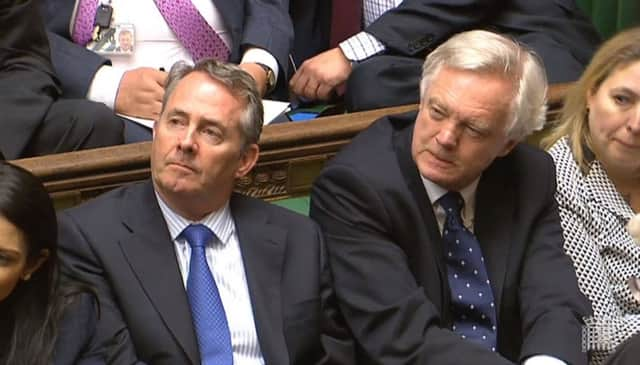Votes from 2016 count for nothing now


The deep differences between leave and remain supporters is now largely irrelevant. Remain supporters want a deal that causes the least damage, while leave supporters want an outcome that maximises the benefits they believe Brexit will bring. These are not incompatible goals, but as things stand, even the most determined leave supporter must be wondering how the Brexit dividend they voted for can be delivered.
It is clear now that in 2016 there was no leave plan, and indeed there is still no plan for a hard Brexit outcome. When the leave enthusiasts successfully persuaded many farmers to vote to escape EU red tape, they made it all sound so simple. We were promised a farm support model tailored to local conditions. Now there is no guarantee of long-term funding, and indeed no local Executive to implement policies designed to suit local agriculture.
Advertisement
Hide AdAdvertisement
Hide AdThe other assumption was that we would stay in the single market. I cannot recall anyone suggesting in 2016 that this would not be possible. When that confidence faltered the claim shifted to a no deal outcome not being a problem. Instead, we would simply implement World Trade Organisation tariffs, and after a few bumps on the road it would be a smooth ride to a better future with our new trading partners outside the EU-27.
One of those to the fore in claiming this could happen was the International Trade minister, Liam Fox. However he was delivered a dose of cold, commercial and political reality when the WTO members, which the UK is not, made clear that this would not be an automatic process. Instead, in the event of a no deal exit from the EU, the UK faces negotiating WTO tariffs on a commodity by commodity basis. Those blocking the easy route for the UK were led by Russia, but included the United States.
That US involvement is ironic, since Fox has made clear he regards the big prize of Brexit as a trade deal with Washington. His enthusiasm for that has not been dented by studies that show it would have little impact on the UK economy – and would certainly not offset loss of the single market. For agriculture it would be a trade deal with more negatives than positives, since the US is interested in exporting, not importing mainstream agricultural products. That has left the no deal option looking an even less encouraging prospect, and hopefully Fox and his fellow no deal enthusiasts now have a Plan B in place. The concept of membership of the European Economic Area, along with Norway, now has to look a more realistic alternative.
It is easy to forget that while the big Brexit beasts grab the news headlines the Conservative party and government is split from top to bottom over Europe – and always has been. This was clear at a recent conference organised by European farm unions to discuss the impact of Brexit. The message was that in or out of the EU the UK’s farming industry would continue to be influenced by events in the EU-27. The comments of one Tory MP underlined how deep the strains go in that party. Neil Parish is a farmer, turned MEP, turned MP; he was a very good chairman of the European parliament’s agriculture committee, but probably too pro farmer for a ministerial job at DEFRA. While he stressed that the referendum outcome must be delivered, he described the prospect of a no deal Brexit as disastrous for agriculture.
Advertisement
Hide AdAdvertisement
Hide AdReferring to the Agriculture Bill now going through Westminster, he said it would effectively stand the CAP on its head. This is because most funding will go into greening and he stressed that the UK needed to produce food. It is ironic that many farmers voted to leave the EU because of the bureaucracy around greening, but what they are going to get is more greening. On the Bill, he warned that there was too much use of the world ‘may’ and insufficient use of ‘shall’. That is a huge difference for farmers, since it is the difference between support being there at the whim of politicians, or being there as a legal right.